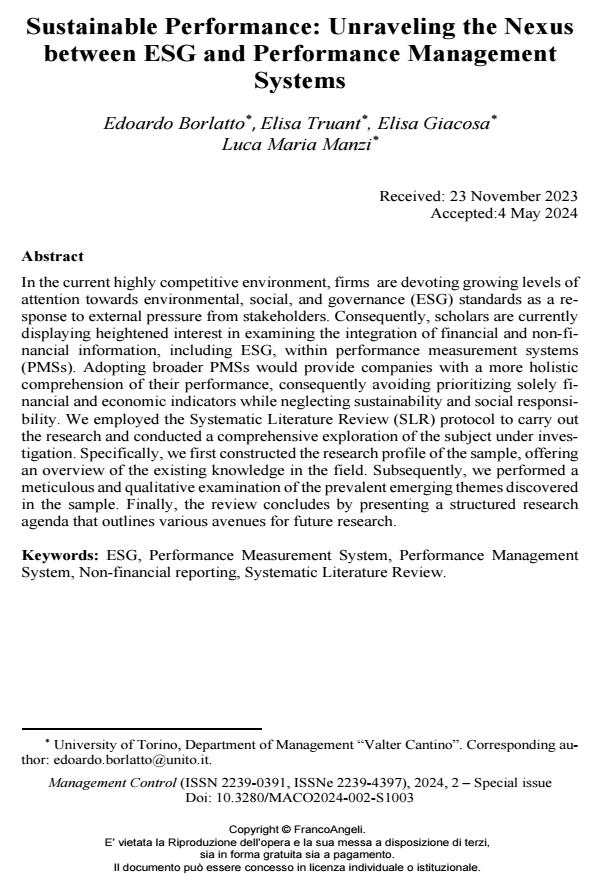Sustainable Performance: Unraveling the Nexus between ESG and Performance Management Systems
Titolo Rivista MANAGEMENT CONTROL
Autori/Curatori Edoardo Borlatto, Elisa Truant, Elisa Giacosa, Luca Maria Manzi
Anno di pubblicazione 2024 Fascicolo 2024/2 Suppl.
Lingua Inglese Numero pagine 24 P. 29-52 Dimensione file 326 KB
DOI 10.3280/MACO2024-002-S1003
Il DOI è il codice a barre della proprietà intellettuale: per saperne di più
clicca qui

FrancoAngeli è membro della Publishers International Linking Association, Inc (PILA), associazione indipendente e non profit per facilitare (attraverso i servizi tecnologici implementati da CrossRef.org) l’accesso degli studiosi ai contenuti digitali nelle pubblicazioni professionali e scientifiche.
In the current highly competitive environment, firms are devoting growing levels of attention towards environmental, social, and governance (ESG) standards as a response to external pressure from stakeholders. Consequently, scholars are cur-rently displaying heightened interest in examining the integration of financial and non-financial information, including ESG, within performance measurement sys-tems (PMSs). Adopting broader PMSs would provide companies with a more holis-tic comprehension of their performance, consequently avoiding prioritizing solely financial and economic indicators while neglecting sustainability and social re-sponsibility. We employed the Systematic Literature Review (SLR) protocol to car-ry out the research and conducted a comprehensive exploration of the subject un-der investigation. Specifically, we first constructed the research profile of the sam-ple, offering an overview of the existing knowledge in the field. Subsequently, we performed a meticulous and qualitative examination of the prevalent emerging themes discovered in the sample. Finally, the review concludes by presenting a structured research agenda that outlines various avenues for future research.
Parole chiave:ESG, Performance Measurement System, Performance Management System, Non-financial reporting, Systematic Literature Review.
- Le aziende nell'era della twin transition: i sistemi di management e controllo a supporto dell'agilità e della resilienza Antonio Corvino, Marika Intenza, in MANAGEMENT CONTROL 3/2026 pp.5
DOI: 10.3280/MACO2025-003001
Edoardo Borlatto, Elisa Truant, Elisa Giacosa, Luca Maria Manzi, Sustainable Performance: Unraveling the Nexus between ESG and Performance Management Systems in "MANAGEMENT CONTROL" 2 Suppl./2024, pp 29-52, DOI: 10.3280/MACO2024-002-S1003